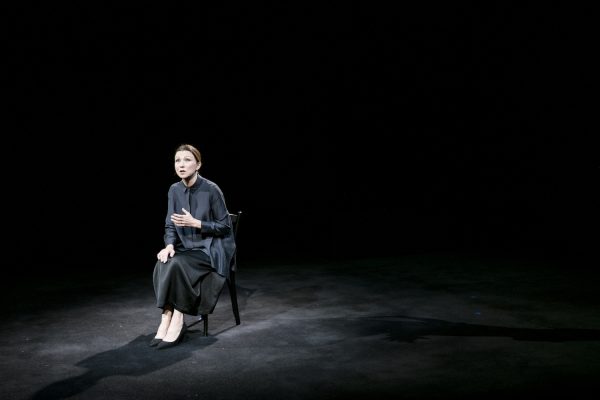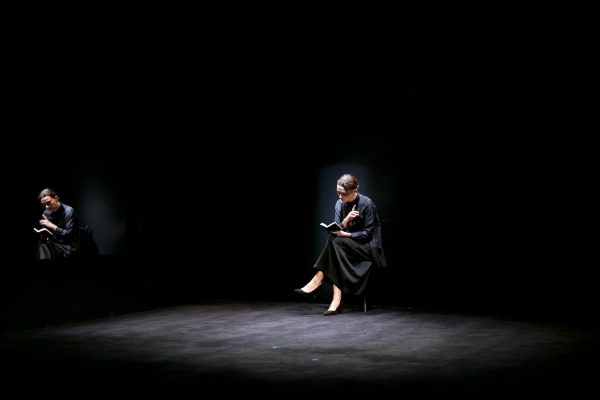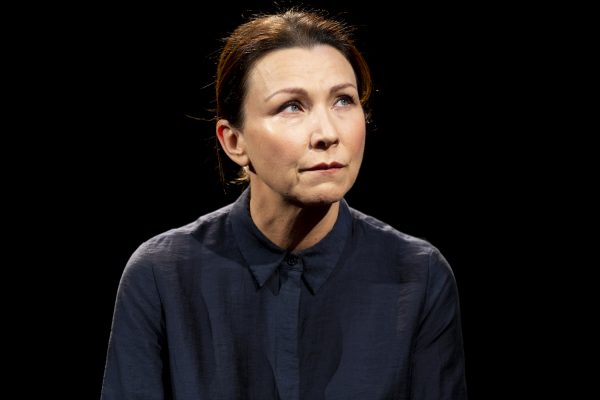A Room Of One’s Own review
12.05.21

Virginia Woolf’s A Room Of One’s Own was written and performed as a series of lectures almost a century ago, but it still maintains relevance today. It has been adapted by director Carissa Licciardello and writer Tom Wright as a play, and is currently being performed in its second season at Belvoir Street Theatre.
As you sit in your seat waiting for the show to start, you can’t help but feel that you have entered one’s space. There is a centred chair and a filled glass of water sitting next to it on the floor, suggesting someone’s arrival, and the mirror at the back of the space warps your vision and confronts you with your role as a spectator, as a listener in this space. The theatre then becomes completely submerged in darkness and Virginia (Anita Hegh) appears.
All I have been able to think about since seeing the show, is how much I hated having to do monologues in high school. I was repulsed by the thought because I knew once I got up that I would have nowhere to hide.
Hegh does not show any sign of fear throughout the full 85 minutes of the show. She completely owns the space. Every word she speaks has an explicit purpose behind it. Hegh is able to actively engage the audience through complex language, ideologies and alternate worlds that could feel isolating if one were reading them for the first time. It is completely enthralling being able to watch such a powerful performance, and many in the audience were unable to stop themselves from leaning forwards in their seats.

In contrast to Hegh’s power in speech, Ella Prince’s performance was powerful in silence. Prince was able to reflect Virginia’s (Hegh’s) words and bring them to life without imposing a character’s agenda onto the images they were conveying. The tableaus and small scenes Prince performed in response to Virginia’s (Hegh’s) words were striking.
The sense of urgency conveyed at the end of the play – for women to write, and for women to be paid, for women to be acknowledged, for the women before them to be acknowledged, for women to have the opportunity to have and do all these things at once – was like a battle cry.
It was an important reminder of how essential storytelling is, and the cruciality of giving marginalised groups the opportunity to become as ubiquitous as Shakespeare.
Rhayne, 20 (She/Her)
___________________________________________________________________________
“A woman must have money and a room of her own if she is to write fiction”.
This is the titular argument expressed in both Virginia Woolf’s 1929 essay and by extension Belvoir’s return season of Carissa Licciardello and Tom Wright’s stage adaption A Room Of One’s Own; an exploration into the history of women’s gender identity (or should I say lack of) and role in literature throughout the ages.
However, the delight in this performance is not to be found in these definitive statements but rather through the exploration of her thoughts, feelings and opinions and the journey she takes towards forming them. As stated by Hegh’s embodiment of Woolf herself “I am going to develop in your presence as fully and freely as I can the train of thought which led me to [this opinion],”.

This venture however is not one that is to be taken physically, the performance itself being quite stagnant in movement; therefore allowing Woolf’s words to do the work.
To be able to hold an audience’s attention through direct address for a duration of 85 minutes (no interval) without much help of a linear plot or character relationships is not an easy job to do, however Anita Heigh does this brilliantly. The didactic nature of her delivery of Woolf’s words coupled with her brilliant comedic timing and audience instinct keeps us, the audience (and in essence her students), engaged to her very last line and leaves us reflecting on the thoughts feelings and opinions expressed; long after we leave the Belvoir seats.
As mentioned before, the performance doesn’t rely too much on the design aspects of stagecraft in the creation of meaning. As stated by David Fleischer in his designer’s note “The set itself very much adheres to the Modernist ideal of ‘form follows function’ – and the primary function of this work, in many ways, is to allow the words that Virginia has created, to penetrate our minds”. Therefore, the set itself is quite minimalistic in nature. At first glance, all that can be seen on stage is a single wooden chair along with a 3 by 3 mirror (said to have been included to make us, the audience feel like Woolf’s own students). As the performance progresses however we see that this mirror is in fact double-sided and here holds a box, or a ‘room’ should I say where Ella Prince’s ‘Woman’ can be seen intermittently throughout the piece as a reflection of the woman’s role in society and literature as a support to Hegh; as her words take us through the ages.
Belvoir’s return season of A Room Of One’s Own is not only an engaging night at the theatre but also an exploration of gender roles and identity and the limitations that are put on us today as fellow ‘women’ and artists. These are issues that are still very prevalent to us today and I could not recommend it more!
Tahlia, 20 (She/Her)
Belvoir St Theatre’s A Room Of One’s Own is playing until May 23. Book your tickets here.

